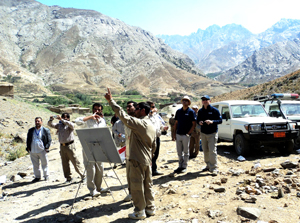Another minefield in Afghanistan–this time in the Panjshir Valley, about 150 km west of Kabul–is back in the hands of local communities cleared of mines by Australian Government-funded local and international partners.
Since 2011, Australia's support has helped community-based demining teams to clear 6.3 sq km, directly benefiting more than 20,000 people, delivering mine risk education to more than 500,000 people and training 1,621 teachers to deliver mine risk education.
In the Rokha District of the Panjshir Valley, the Danish Demining Group and the Afghan Organisation for Mine Clearance and Afghan Rehabilitation are clearing minefields laid first by former Soviet forces, and then during the civil war to deny access to the Taliban during the 1990s.
Demining in the valley means increased opportunities in farming and grazing for local communities.
Afghanistan is one of the most heavily contaminated countries in terms of landmines and explosive remnants of war–around 3.7 per cent of the total population still live within 500 metres of landmine contaminated areas.
But demining has been one of Afghanistan's success stories. Over the past 20 years, nearly 22,000 hazard areas throughout the country have been cleared, releasing 1,860 sq km of land for productive use, including farming. Currently, demining employs around 12,000 mainly Afghan personnel.
Australia is working with the United Nations Mine Action Service (UNMAS) and the Mine Action Coordination Centre for Afghanistan (MACCA) to help Afghanistan meet its annual targets and its commitment under the Ottawa Mine Ban Treaty to become landmine-free by 2023.
Australian support is contributing to training in mine action activities, mine clearance, increasing awareness of mines and other explosive remnants of war within local communities, and improving services for mine victims and people with disabilities.
Australia's contribution in 2012–13 has:
- helped construct 30 ramps, three pathway adaptations, 15 slopes, six stairs and one gate adaptation, enabling access for people with disabilities in government buildings and public spaces in Kabul province
- provided physiotherapy, orthotic and prosthetic services to 1,218 patients (including 178 females)
- recruited/trained 80 community volunteers to refer patients to rehabilitation service providers
- trained 24 health service providers from 21 provinces in disability awareness and physical rehabilitation training of trainers
- delivered victim assistance awareness to 6,749 community members (including 1,286 females)
- provided support to the livelihood activities of 20 mine/ explosive remnants of war survivors
- distributed victim assistance material to communities
- delivered mine risk education to 118,166 people (a third of them women and girls)
- trained 961 teachers and headmasters and 1,241 parents of children with disabilities on inclusive education.

